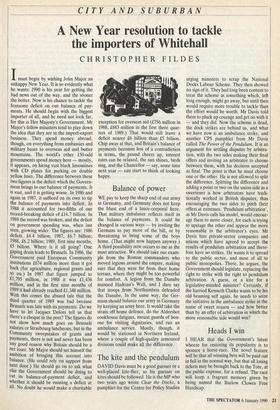CITY AND SUBURBAN
A New Year resolution to tackle the importers of Whitehall
CHRISTOPHER FILDES
Imust begin by wishing John Major an unhappy New Year. It is so evidently what he wants; 1990 is his year for getting the bad news out of the way, and the sooner the better. Now is his chance to tackle the fearsome deficit on our balance of pay- ments. He should begin with the biggest importer of all, and he need not look far, for this is Her Majesty's Government. Mr Major's fellow ministers tend to play down the idea that they are in the import-export business. They spend money abroad, though, on everything from embassies and military bases to overseas aid and butter mountains. The world's other 150-odd governments spend money here — mostly, it appears, on hiring vast black limousines with CD plates for parking on double yellow lines. The difference between these two figures is the deficit which the Govern- ment brings to our balance of payments. It is vast, and it is getting worse. In 1986 and again in 1987, it sufficed on its own to tip the balance of payments into deficit. In 1988 it accounted for two-fifths of our record-breaking deficit of £14.7 billion. In 1989 the record was broken, and the deficit on government spending was, when last seen, growing wider. The figures are: 1986 deficit, £4.4 billion; 1987, £6.7 billion; 1988, £6.2 billion; 1989, first nine months, £5 billion. Where is it all going? One gaping drain leads to Brussels. In 1986, the Government paid European Community institutions £674 million more than it got back (for agriculture, regional grants and so on.) In 1987 that figure jumped to £1,795 million, in 1988 it was £1,436 million, and in the first nine months of 1989 it had already reached £1,348 million. With this comes the absurd tale that the third quarter of 1989 was bad because Brussels was late with its payments. Do we have to let Jacques Delors tell us that there's a cheque in the post? The figures do not show how much goes on Brussels salaries or Strasbourg luncheons, but in the Community sweepstakes of grants and payments, there is not and never has been any good reason why Britain should be a net loser. Mr Major should set himself the ambition of bringing this account into balance. (He could rely on support from next door.) He should go on to ask what else the Government should be doing to cut its balance-of-payment deficit, and whether it should be running a deficit at all. No doubt he would make a charitable
exception for overseas aid (£756 million in 1988, £683 million in the first three quar- ters of 1989.) That would still leave a deficit nearer £6 billion than £5 billion. Chip away at that, and Britain's balance of payments becomes less of a contradiction in terms, the pound cheers up, interest rates can be relaxed, the sun shines, birds sing, and the Chancellor — say, some time next year — can start to think of looking happy.










































 Previous page
Previous page